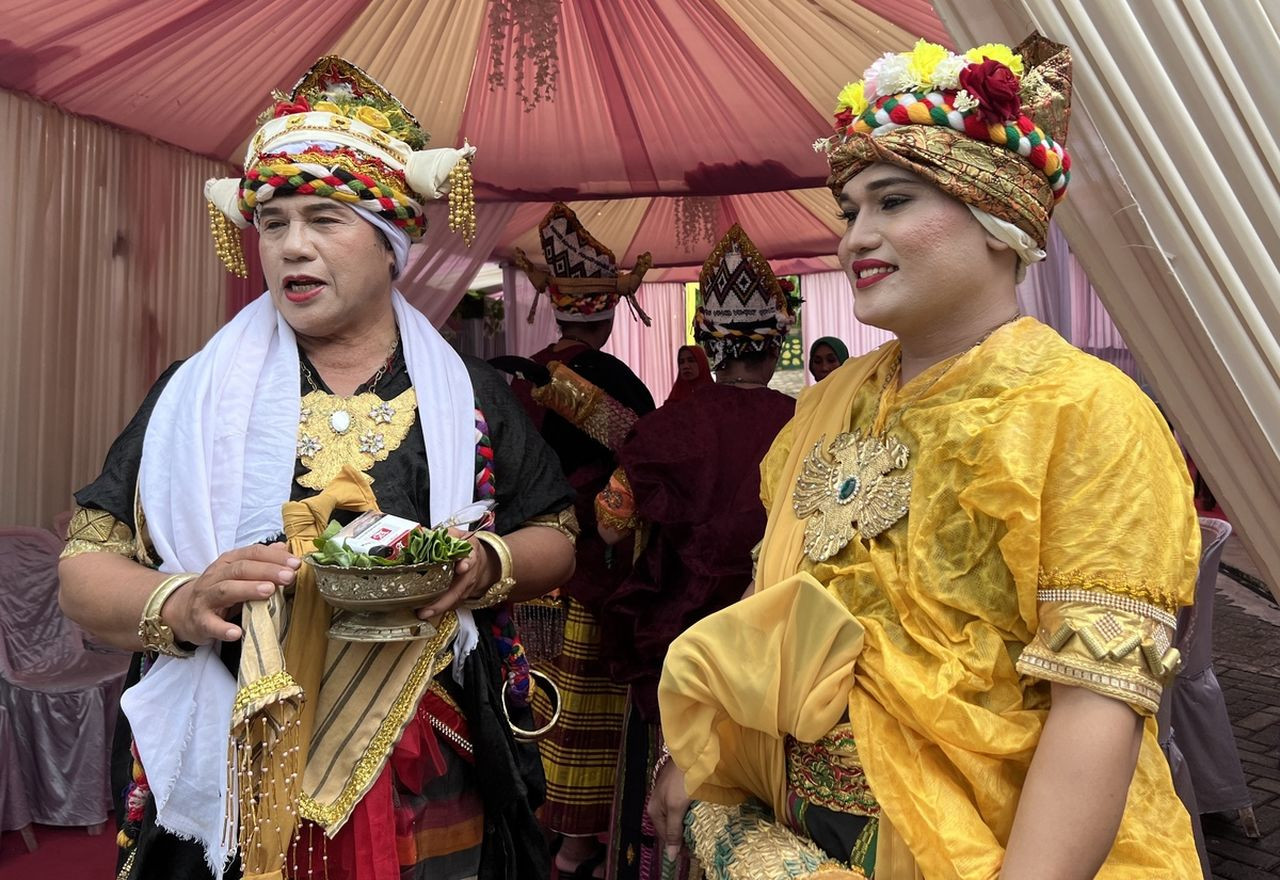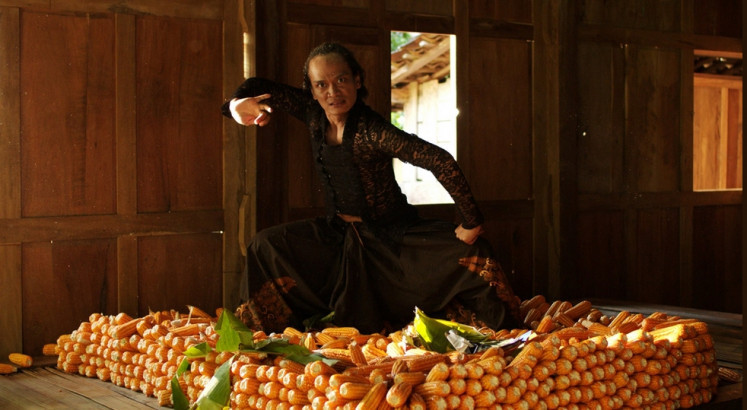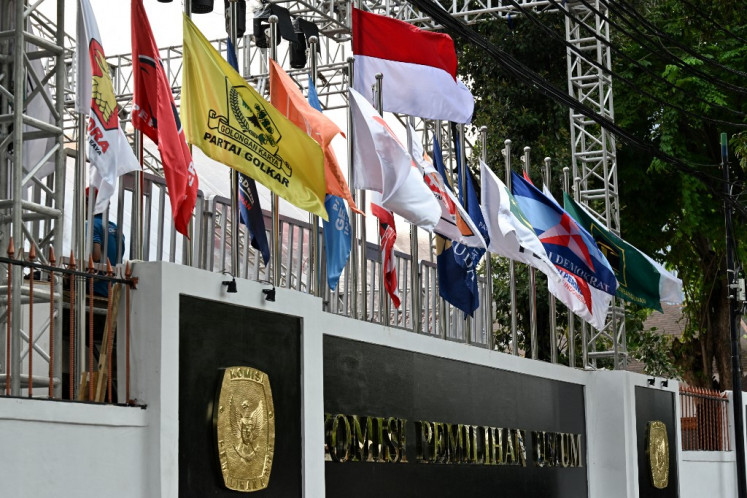Popular Reads
Top Results
Can't find what you're looking for?
View all search resultsPopular Reads
Top Results
Can't find what you're looking for?
View all search resultsIndonesia's nonbinary traditions in spotlight amid LGBTQ discrimination
Change text size
Gift Premium Articles
to Anyone
Nonbinary has always been part of our culture. It's time to recognize and embrace it.
A recent video in which a student self-identifying as nonbinary was kicked out of their university has brought to the fore discussions about nontraditional understandings of gender among Indonesians.
Indonesia has a long history of gender nonconformity and transgender identity. Erik Nadir, communications officer at Asia Pacific Transgender Network, and Reymigius, a writer based in Tangerang, Banten, who both identify as nonbinary, shared that most conservative Indonesians often mistake the LGBTQ idea as an import from Western society, which is viewed as being overwhelmingly liberal—a mistaken and ironic perception since gender discrimination exists in the West as it does elsewhere.
If anything, Indonesia has always been very progressive in its view of gender. Many cultures here, such as the Bugis and Javanese, were welcoming toward gender nonconformity and transgender identity—even considering it sacred.
"Understanding our cultures, will help the LGBTQ communities in Indonesia to explain that it's always been part of our country," said Nurdiyansah Dalidjo, a queer writer.
There is also the adjective “gender nonconforming”, which is generally used for activities or behaviors that does not follow established gender norms. People of any gender identity might act or behave in a gender-nonconforming way, whether knowingly or not.
While discussions about gender nonconformity generate a host of differing opinions, even among gender-nonconforming individuals and within their communities, nonbinary generally refers to individuals who do not identify as either male or female.
A progressive culture
In the Bugis tradition, tribes divide society into oroane (man), makkunrai (woman), calabai (trans man), calalai (trans woman) and bissu. Bissu have a vital role in leading traditional ceremonies as a bridge of communication between the gods and humans through traditional processions using the To Rilangi language.
In Toraja, meanwhile, religious leaders are either burake tattiku (a woman) or burake tambolang (a man dressed as a woman). Burake, both women and men, are responsible for leading their communities in spiritual ceremonies and harvest rituals.
In the Javanese tradition, lengger lanang, a traditional Javanese dance originating from Banyumas, Central Java, is performed by a man. The Jakarta Post previously reported that the term lengger is the shortened form of the Javanese phrase diarani leng jebule jengger, which roughly translates as "thought to be a woman, turns out to be a man”.
The dance is believed to please the goddess of fertility, Dewi Sri, and the performance itself has been popular since the 16th century. These days, a stigma has accrued to the culture.
Ryan Nurgia Nova is a lengger lanang performer based in Banyumas, who first got interested in the dance during his elementary school days before they started to take lessons at Sanggar Langgeng Sari, Central Java, in 2016. Ryan became interested in the performance because it can represent both the masculine and feminine sides of one body.
"There's nothing to be ashamed of, it's part of the culture, and it's important for us to preserve it," Ryan said.
Possessed: The dance highlighted in the movie is 'lengger', where dancers are men dressed as women and believed to be possessed by 'indang' (spirits) during the performance. (Courtesy of Fourcolours Films) (Courtesy of Fourcolours Films/Courtesy of Fourcolours Films)Cultural shift
Erik cites a research paper by Ais Nurbiyah Al-Jum'ah, a gender researcher who studied Bugis society in 2018. The research showed that there was a cultural shift during the 16th century, due to the expansion of Islamic teachings and other Abrahamic religions.
Post-colonial society also believed the Bugis culture violated religious norms and regarded it as being behind the rise of feudalism. Therefore, traditional ceremonial and ritual tools were burned and dumped in the sea. Some bissu preferred death rather than betraying the deities.
There were also mass killings of bissu during the purges in 1965, when bissu were suspected of being members of the Indonesian Communist Party (PKI). In 1966, Operation Pertobatan was launched by Kahar Muzakkar, leader of an Islamic movement in South Sulawesi that targeted the bissu community.
Meanwhile, in Java, women started to perform lengger in 1918, replacing the male performers. However, lengger.idreported that there was little research in Indonesia into the traditions.
Erik explained that binary gender labels exist to protect a patriarchal society despite the complexity of the gender spectrum.
"Binary gender roles are a system of power that is enforced as a means of protecting patriarchal norms. For example, it's considered important for men to work while women stay at home taking care of their children, hence leaving them no other option," Erik said.
Erik added that many aspects of gender nonconformity exist in society and are regarded as normal. For example, some individuals need to take roles as both female and male at the same time as being a single mother or single father.
Meanwhile, Ais shared that being nonbinary among indigenous peoples is more than just a label.
"And being bissu is not about gender or sex, but their relationship with the gods," Ais said. Ais added that in the Bugis tradition, their gods have both feminine and masculine sides and are not gender-specific.
Reymigius added that it was important to acknowledge the gender-nonconforming community because everyone deserves representation.
"Gender nonconformity has always been part of humanity, because individuals have both feminine and masculine sides," Erik closed.











